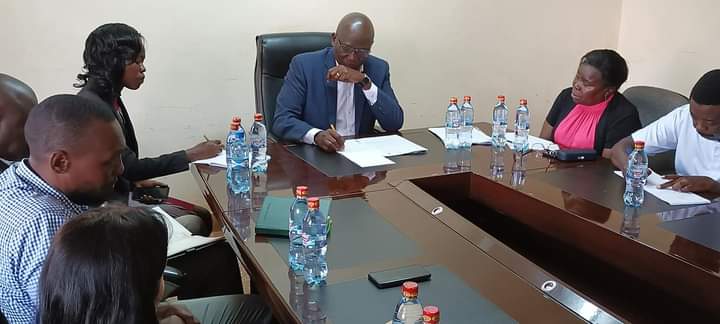The County Government of Busia has given a nod for the launch of Tobacco-Free Farms in the county
which aims at improving health and livelihoods by shifting farmers from growing tobacco to other sustainable crops.
Deputy Governor, H.E Arthur Odera gave the assurance today when he met a team from the World Health Organization, Kenya Country Office led by Dr Joyce Nato that had paid him a courtesy call in his office.
ACIP Odera said they are glad the WHO team has come to deal with the issue of tobacco which has adverse effects on health, water, productivity and environment, noting that it will be a game-changer in improving farmers livelihoods.
“The only problem which needs to be addressed is to encourage farmers to venture into a variety of crops instead of one which might also be counter-productive like tobacco,” he said, adding that Busia is an agricultural endowed county.
He added: “I appreciate the National Government and all the partners in the Tobacco-Free Farms project for choosing Busia County to pilot this important global initiative aimed at curtailing the adverse health, environmental and economic effects of tobacco growing and utilization.”
Dr Nato said the project is a joint initiative between the World Health Organization (WHO), the World Food Programme (WFP), Food and Agriculture Organization and UNCDPA, in collaboration with the National and County Governments to support tobacco farmers to make them switch to other alternative crops.
“Tobacco growing not only exposes farmers to a number of health risks, including a form of nicotine poisoning known as” green tobacco sickness,” but it also contributes to perennial debts, increased gender inequality and significant environmental degradation,” she said.
Dr Nato added: “The Nicotine in the leaf is very harmful especially to persons who engage in its growth. They absorb nicotine equivalent to a person who smokes 50 cigarettes per day, this is very harmful. Tobacco also bleaches the farms, thus making it difficult to intercrop and farming uses alot of agrochemicals which are very harmful to human beings, animals and water table.”
The WHO official also said tobacco growth leads to deforestation because we must cure the leaf before getting it to the industry, noting that other value chain crops yield over Ksh50,000 per acre compared to tobacco which yields only Ksh. 15,000.
Dr Nato said farmers in Migori which kick-started the pilot project have planted high-iron beans as an alternative crop, with UN agencies and the government providing training, quality inputs such as seeds and fertilizers, and a ready market for the harvest, through WFP’s local procurement initiatives.
Tobacco kills more than 8 million people around the world every year and over one million of those death are attributed to exposure to second-hand smoke. In Kenya, more than 6,000 people die of tobacco-related diseases every year.
Photos: Busia Deputy Governor, H.E Arthur Odera with a team from WHO in his office.


